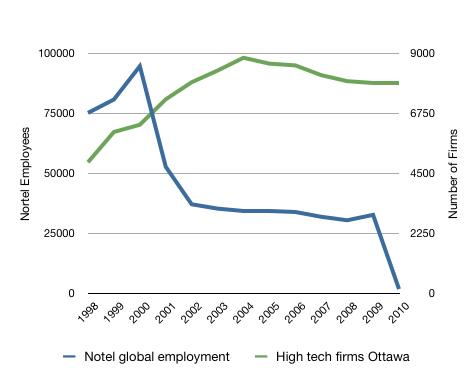To absolve my guilt about not blogging more, I'll simply say that it's been a very busy year. The results of that busy year are now coming to fruition with two of my new articles on entrepreneurial cultures and ecosystems coming out in the past few weeks. First, I just published an article in the Journal of Economic Geography on regional entrepreneurial cultures and mentorship. This is work that came out of my dissertation that looked at the origin of entrepreneurial practices. I was interviewing entrepreneurs in Ottawa and Waterloo, Canada, and saw huge differences in both the number of entrepreneurs who had mentors. The difference was only seen looking between the two cities: it didn't matter if they were high-growth of lifestyle entrepreneurs or serial vs first time firm founders.

The reason for this was the relationship between each city's local culture and the shared culture of 'tech entrepreneurship' — the general feelings and understandings about entrepreneurship created by the global business media and entrepreneurial communities. That later culture sees mentorship as a real important part of the entrepreneurship process, but the importance of mentorship differs within different regional cultures based on a variety of factors.
So, how do we understand the complex interplay of local and non-local cultures? I argue that the work of Pierre Bourdieu can be very useful. Bourdieu talks about fields — ordered systems of social rules and relations — and habitus, people's internalised understandings of how fields work. Entrepreneurs are embedded in both their local field as well as the more global field of the technology entrepreneurship community. Entrepreneurs have to be very skilled at navigating the often conflicting norms found within different fields.
The paper is very conceptual and tries to build a model of entrepreneurial culture from a Bourdieuian perspective. The main take away is that instead of talking about if a place has an 'entrepreneurial culture' or not, we should be better concerned about the different types of fields entrepreneurs are embedded in and how they understand their overlapping position in them. This stops culture from being some monolithic, deterministic force and helps us understand it as a more nuanced context that contributes to entrepreneurs' own practices.
The second article, in the International Journal of Innovation and Regional Development, is an empirical peek at how Edinburgh's entrepreneurial ecosystem works. It reports some early work I did on the role of different entrepreneurial support programs that operate within Edinburgh's entrepreneurial ecosystem.
I think there are two important findings in this paper. One, Edinburgh has a huge number of different public and private programs designed to support high-tech entrepreneurs. I counted somewhere around 45, but that's a very conservative estimate. While I think Edinburgh is at the high end of the number of programs for a city of it's size, it's clear that most communities don't have just one program but a whole network of programs that work together to support entrepreneurs. This is echoed in a recent study of St. Louis by researchers at the Kauffman Foundation in Entrepreneurship and Regional Development.

Second, I didn't see much competition between these programs. While they overlapped to s0me extent in the types of support they provided (see figure above), they were generally able to specialise in different industries and stages of the entrepreneurship process, handing off entrepreneurs to different programs as their needs changed. This creates a pipeline that entrepreneurs can enter and ensures that they are supported throughout their journey.
